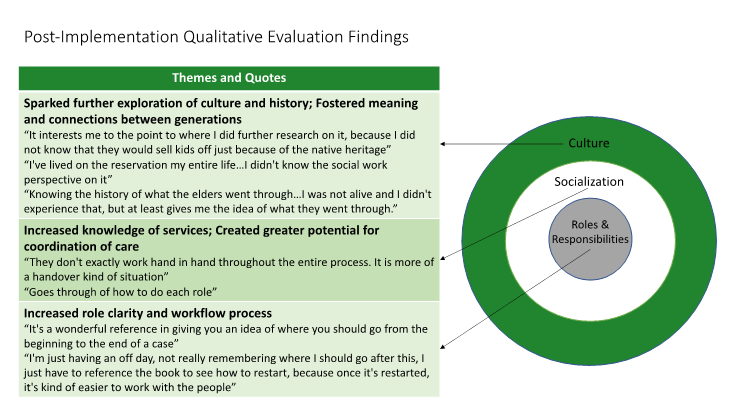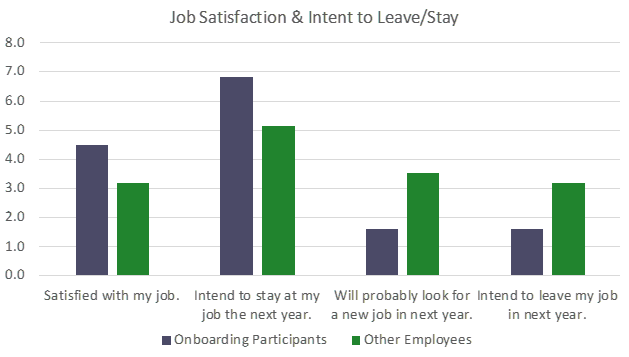Onboarding Program
Background
The QIC-WD worked with the Eastern Band of Cherokee Indians (EBCI) Family Safety Program (FSP) to address workforce challenges. FSP is a relatively new agency, established in 2015, and when they began working with the QIC-WD in 2017, FSP employed approximately 20 social workers, who provided direct service to children and families. Persistent vacancies were of greater concern than turnover. The QIC-WD partnered with FSP to conduct a needs assessment and identify areas of need that could be addressed through a workforce intervention. Three areas of need were identified as offering the strongest opportunities for intervention through the QIC-WD project: (1) team cohesion across the various agency units, (2) unhealthy levels of employee stress and work overload, and (3) inconsistent onboarding practices.
Through discussion of the root cause analysis and theory of change exercises, the agency and the implementation team decided to develop an onboarding program for new child welfare workers because it addressed root causes related to multiple identified needs: role clarity, social integration, and understanding of Cherokee history and culture. The intervention is a five-week onboarding program, developed in consultation with locally recognized cultural experts, existing FSP staff, and the QIC-WD implementation team. Onboarding program elements included:
- a structured, interactive review of FSP’s policies and procedures;
- incorporation of a mock family case to illustrate the full case process for new employees;
- inclusion of content related to Cherokee culture and history, and culturally sensitive practice; and
- shadowing of workers from all five FSP team units to encourage an understanding of all aspects of work performed within FSP and strengthen relationships across team units.
A worker’s onboarding manual with activities for the new employee to complete was complemented by a supervisor manual to guide weekly meetings between the supervisor and their new employee through the initial weeks of employment.
This intervention was developed specifically for and with EBCI FSP, therefore, feasibility and acceptability were the major focus areas of the implementation evaluation. Additionally, participant reactions (both new employee and their supervisor) were key.
Workforce Demographics
 All employees with start dates between July 27, 2020, and August 2, 2021, participated in the new onboarding program (N = 10). Among the 10 onboarding participants, seven were enrolled EBCI members and six were women and four were men. All five FSP units had at least one new employee hired during this period. This allowed all five FSP supervisors to provide feedback about the onboarding program, with some supervisors having multiple new employees who participated. The number of new employees within each unit included: Intake/Investigations (2), Family Integrity & Preservation (2), Integrated Child Welfare (3), Indian Child Welfare Act (2), and Adult Protective Services (1).
All employees with start dates between July 27, 2020, and August 2, 2021, participated in the new onboarding program (N = 10). Among the 10 onboarding participants, seven were enrolled EBCI members and six were women and four were men. All five FSP units had at least one new employee hired during this period. This allowed all five FSP supervisors to provide feedback about the onboarding program, with some supervisors having multiple new employees who participated. The number of new employees within each unit included: Intake/Investigations (2), Family Integrity & Preservation (2), Integrated Child Welfare (3), Indian Child Welfare Act (2), and Adult Protective Services (1).
Evaluation Findings
The 10 employees who participated in the new onboarding program, along with their supervisors, completed implementation surveys at the end of the second and fifth weeks. At the end of the second week of onboarding, most new employees had completed supervisor meetings, and a majority had finished 75% to 100% of the assigned modules. Many employees found the estimated module completion time accurate or quicker than expected. One-third of new employees noted that their workspace was not ready on their first day, and less than half said they felt “very welcomed during their first days on the job.” By the end of the fifth week, almost all new employees had met with their supervisors and completed the assigned modules. No content was reported as confusing or unclear.
Some supervisors expressed concerns about the time required for managing onboarding and the duration for employees to complete it. Both employees and supervisors mentioned challenges related to COVID-19, such as reduced office presence and social distancing measures impacting certain activities like shadowing.
The outcome evaluation consisted of a mixed-methods quasi-experiment. Qualitative baseline data were collected from all existing FSP staff (N = 34) in July 2019 and from new employees who received the intervention (N = 10) approximately 90 days after their first day of employment. Additionally, in September 2021, quantitative data were collected from both onboarding program participants and other employees (total N = 26 of which 20 were hired before onboarding was implemented, and six participants received the onboarding intervention). Of the ten people who participated in the onboarding intervention, two participants were no longer employed by the agency, and two did not complete the September 2021 survey. Finally, focus groups with supervisors and employees were conducted in January 2022 to improve the validity of the evaluation.
Onboarding participants’ experiences differed from previously hired workers in the following ways. For onboarding participants:
- The training around historical grief within the Cherokee community impacted how they approached family trauma in the community. Thus, they had a more developed understanding of Cherokee culture than employees hired before the intervention.
- The intervention created opportunities for better integration and coordination of care on behalf of families. Employees better understood their units and how they fit into the care cascade in which families experience FSP.
- Employees gained greater clarity of workforce roles and responsibilities, thus understanding how to complete tasks for their caseload and lessening stress throughout their workday.

Quantitative results should be considered preliminary due to the small sample. That said, onboarding participants and other employees' organizational socialization scores were comparable. This finding is notable since it suggests that the onboarding program helped accelerate the organizational socialization processes, particularly in the context of connecting with other employees and understanding organizational goals and values. Scores on supervisor support and quality did not significantly differ among groups, although onboarding participants had higher scores on all four measures of supervisor support. Onboarding participants also reported significantly higher job satisfaction and a lower likelihood of looking for another job and leaving their current job compared to other employees (see image). Finally, onboarding participants reported significantly higher resilience scores than other workers.
Qualitative interviews indicated that dedicated shadowing time was the most valued activity in the onboarding experience. This provided job-related learning and fostered peer connections The quantitative results also supported this finding, suggesting the onboarding program may have accelerated organizational socialization among new employees. This may have resulted in new employees’ higher job satisfaction and lower likelihood of looking for another job and leaving their job. Future research is needed to determine whether the intervention impacts actual tenure.

One consideration for EBCI FSP and other tribal entities is whether there is a need for more customized onboarding processes based on identity characteristics and lived experience. The onboarding needs of the following new employee constituencies may differ considerably: a) enrolled members of EBCI, b) enrolled members of other tribes/persons who are indigenous, c) persons with prior work experience in child welfare outside of the Boundary, and d) persons with none of these identities or experiences. Adaptations of the onboarding program should consider the addition of some content tailored to each of these constituencies.
Finally, through close coordination between the QIC-WD team and EBCI FSP staff, along with contributions from local elders, content experts, and community leaders, the onboarding intervention acknowledged cultural differences in learning styles and indigenous/aboriginal pedagogies. This deliberate partnership may provide an important context for some of the positive outcomes observed among onboarding participants in this study.
The Team
This project would not have been possible without the support of EBCI FSP and their dedicated data coordinator and site implementation manager, Meghan Arnold. The project team wishes to thank Patty Grant and Tom Belt, elders who provided guidance and advice throughout the project. We also wish to acknowledge the contributions of members of the EBCI Public Health & Human Services department, Medical Institutional Review Board, and the supervisors and workers of the Family Safety Program. Their support, insights, and dedication were essential to the success of this project.
The QIC-WD would like to acknowledge the work of the team members who contributed to the implementation and evaluation of the telework intervention. Team members included Martin Hall, Candace Fleming, Stephanie Weddington, Lesley Harris, Ashley Long, Jonathan Litt, and Robert Blagg.